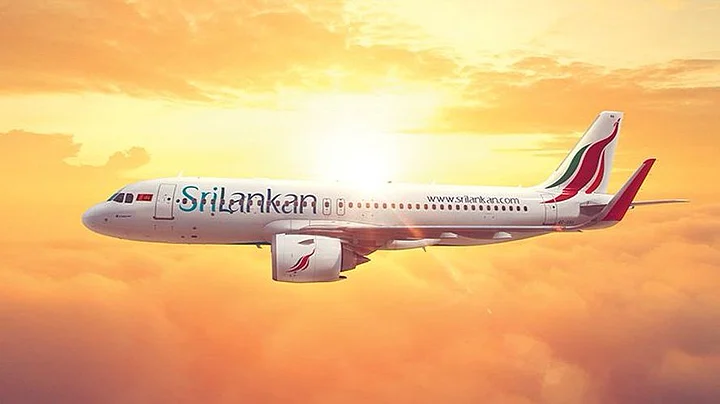Sri Lanka's new Prime Minister Ranil Wickremesinghe, on Monday, 16 May, proposed privatising the country’s loss-making national carrier Sri Lankan Airlines amid the ongoing crisis in the island nation.
The country has also been forced to print money to pay government salaries and is on the verge of formally defaulting on foreign debt, with the grace period of two unpaid foreign bonds ending on Wednesday, 18 May. The new PM also pledged to announce a new relief budget to replace President Gotabaya Rajapaksa's "development" budget that stoked Asia's fastest inflation rate.
For the past several weeks, Sri Lanka has been going through an economic meltdown of a scale unseen since the country's financial crisis of 1948. As a result, prices of essential commodities like rice, milk, and oil have skyrocketed, resulting in massive nationwide protests and political instability.
The government's plan to sell its national airline to check losses is a part of its efforts to stabilise the country's finances.
Wickremesinghe informed that the carrier lost 45 billion Sri Lankan rupees ($124 million) in the year ending March 2021, reported Bloomberg.
"Even if we privatise Sri Lankan Airlines, this is a loss that we must bear. You must be aware that this is a loss that must be borne even by the poor people of this country who have never stepped on an airplane," Wickremesinghe said, as per Al Jazeera.
Sri Lankan Airlines was managed by Emirates Airlines from 1998 to 2008.
The government had bought back a stake in Sri Lankan Airlines from Dubai's Emirates in 2010. The national carrier has a fleet of 25 Airbus SE planes. It flies to various destinations, including Europe, the Middle East, and South and Southeast Asia.
Country Printing Money to Pay Salaries
The new PM, who is less than a week into the job, also said he was forced to print money to pay salaries, which will put pressure on the nation's currency. It was reported on Monday, 16 May, that the country was left with just a day's stock of gasoline.
"The next couple of months will be the most difficult ones of our lives," Wickremesinghe said. "We must immediately establish a national assembly or political body with the participation of all political parties to find solutions for the present crisis."
PM Pledges to Announce New Relief Budget
Wickremesinghe further said that the Cabinet would also propose that the parliament increases the treasury bill issuance limit from 3 trillion rupees to 4 trillion rupees, forecasting a budget deficit of 13% of gross domestic product for the year ending December 2022.
Wickremesinghe is yet to appoint a finance minister to lead bailout talks with the International Monetary Fund.
The country is currently seeking bridge loans from countries including India and China. It remains unclear if the government would get the cash since they do not have a full Cabinet at present.
Sri Lanka Sliding Into Default
Sri Lanka is currently sliding into default. The country is nearly bankrupt and has also suspended repaying around $7 billion in foreign loans due this year.
The grace period of two unpaid foreign bonds will end on Wednesday, 18 May. The country has to pay $25 billion by 2026. The country's total foreign debt is $51 billion.
The finance ministry says the country currently has only $25 million in usable foreign reserves. Wickremesinghe informed that around $75 billion is needed urgently to help provide people with essential items. However, the country's treasury is struggling to find even $1 billion.
He further said that there was an acute shortage of medicines, and it was becoming extremely difficult to buy anti-rabies medicines and drugs to treat heart diseases.
"I have no desire to hide the truth and to lie to the public. Although these facts are unpleasant and terrifying, this is the true situation. For a short period, our future will be even more difficult than the tough times that we have passed," Wickremesinghe said.
"We will face considerable challenges and adversity. However, this period will not be long," he said, adding that countries with which he has spoken have pledged to help in the next few months.
Background
Sri Lanka President Gotabaya Rajapaksa had declared a state of emergency in the country from 7 May onwards, giving security forces sweeping powers amid anti-government protests. This was the second time in five weeks that an emergency was declared in the country.
The economic crisis in Sri Lanka has pushed citizens to hit the streets and protest against the ruling dispensation. Thousands of people calling for political change and demanding the resignation of President Gotabaya Rajapaksa are protesting in Colombo.
As a response to this, President Rajapaksa imposed emergency across the country on 11 April for a period of five days. The government reimposed emergency once again on 6 May, after protests went violent in front of the Parliament. The month-long ongoing protest across Sri Lanka also forced President Gotabaya's brother Mahinda Rajapaksa to resign as the prime minister.
Last week, Wickremesinghe, the 73-year-old leader of the United National Party, was sworn in as the island nation's new prime minister.
(With inputs from Bloomberg and Al-Jazeera.)
(At The Quint, we question everything. Play an active role in shaping our journalism by becoming a member today.)
